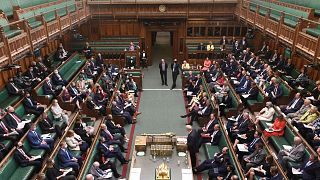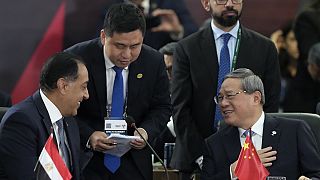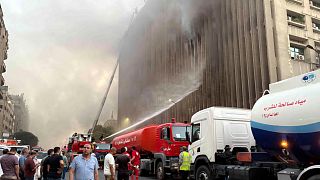Egypt
The treatment of the new coronavirus with plasma brings of hopevto Egypt where there is an estimated 100,000 cases and more than 5,000 deaths.
The 25-year-old land surveyor from Cairo caught the disease in May, on the eve of the Muslim Eid al-Fitr festival, becoming one of the almost 100,000 reported cases in Egypt, where more than 5,000 people have died of the novel coronavirus.
"Losing the sense of taste was a terrible experience," he told the press at Egypt's National Blood Transfusion headquarters in Cairo, describing just one of his symptoms. "You feel like you're eating for the sake of it."
Things got worse for the family when his elderly father was also infected, making Egypt's blistering hot summer months a hellish period of fretting over his recovery from a loud, dry cough and constant fevers.
"I came to donate today because I didn't want someone else to go through what I and my family went through," said the softly spoken young man, one of about 200 volunteers who had so far taken part in the budding project.
Egypt, like the United States and a handful of other countries, is trying to fight the pandemic in part by using convalescent plasma, the watery fluid in the blood of recovered patients that is teeming with antibodies.
After US President Donald Trump touted it as a temporary cure, his administration issued an emergency authorisation last month to use plasma from recovered Covid-19 patients.
The idea is to harvest the plasma and inject it into other patients to give them an immunological boost that helps fight the same infection.
The scientific community is divided on using plasma to treat Covid-19, but proponents say the technique has proven effective in small studies to treat other infectious diseases, including Ebola and SARS.
- 'Glimmer of hope' -
Nascent clinical plasma trials to fight the new pandemic have also been launched in Bolivia, Britain, Colombia, India, Mexico, Pakistan and South Korea.
Ihab Serageldin, director of Egypt's National Blood Transfusion Centre, said he believes convalescent plasma is a promising treatment while the race continues to develop, mass-produce and distribute an effective vaccine.
Since April he has spearheaded Egypt's campaign urging the country's more than 78,000 known recovered patients to donate their plasma.
"Coronavirus is one of these viruses that doesn't have a manual ... we're combatting an unknown enemy, so any form of treatment that offers a glimmer of hope we need to hold onto," he told AFP.
"If the US didn't find it promising then it wouldn't have launched a national campaign urging recovered virus patients to donate their plasma," he said.
Serageldin said in Egypt eligible donors must be aged 18 to 60, weigh at least 50 kilogrammes (110 pounds) and have produced a certain quality of antibodies.
Over 200 people have so far donated plasma, each providing 800 ml of the fluid split into four bags, which are given to two patients at a time.
Serageldin said there was no data yet on the success rate of Egypt's plasma project.
- Budding black market -
Many more donations are needed, he said, stressing that "blood donations in general are low in Egypt, so we're working on raising awareness among the general public."
The meagre numbers of donors prompted advertising executive Ahmed Mostafa, 37, to create an app called Mosanda ("Support") to connect recovered patients with those infected.
Mostafa had a strong motivation -- he had also caught the disease in late May.
"After a month of exhaustion from the virus, I wanted to contribute to making other patients' lives better," he said.
He teamed up with a web developer and medical doctors to design the easy-to-use Android app, which was released in June.
"We want to be the link between patients, but the response has been very slow," he said.
With the minimal uptake online, he is planning to expand his app to make it a general blood donation service, meeting another pressing need in Egypt's strained healthcare sector.
Mostafa also sees the app, and a regulated, centralised plasma project, as a safe alternative to an emerging black market.
In June, local media reported that plasma bags from recovered patients were being informally traded for over 20,000 Egyptian pounds ($1,200) each.
While one parliamentarian called for criminalising the practice, Egypt's foremost Muslim institution Al-Azhar ruled that it was not permissible under Islamic law to trade plasma informally and lambasted those "profiting from the pandemic".
***AFP***












02:20
France: Avignon Festival celebrates Egyptian diva Umm Kulthum
01:42
Gaza conflict overshadows EU-Southern Neighbourhood talks in Brussels
01:05
Ethiopia's mega-dam on the Nile is "now complete", Prime Minister says
01:09
Egypt: Inflation forecast to have climbed further in May
01:05
U.K-Egypt: Mother of jailed activist hospitalised amid hunger strike
02:20
Tarik Saleh returns to Cannes with explosive political thriller ‘Eagles of the Republic’